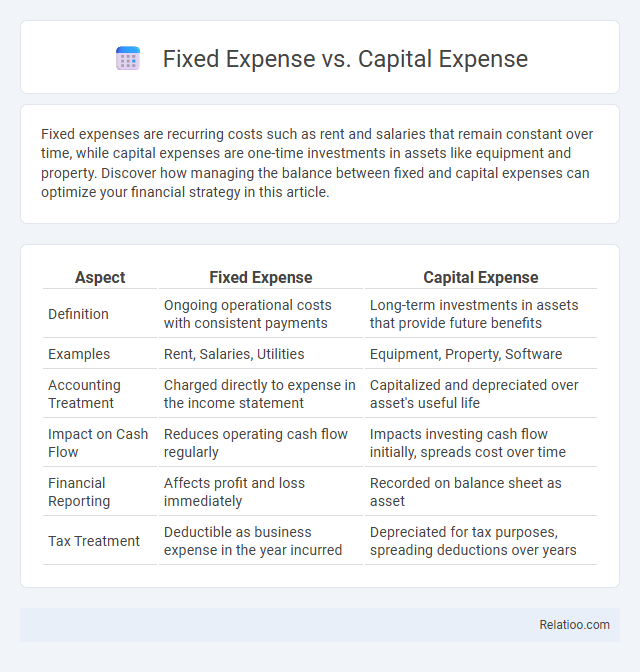Fixed expenses are recurring costs such as rent and salaries that remain constant over time, while capital expenses are one-time investments in assets like equipment and property. Discover how managing the balance between fixed and capital expenses can optimize your financial strategy in this article.
Table of Comparison
| Aspect | Fixed Expense | Capital Expense |
|---|---|---|
| Definition | Ongoing operational costs with consistent payments | Long-term investments in assets that provide future benefits |
| Examples | Rent, Salaries, Utilities | Equipment, Property, Software |
| Accounting Treatment | Charged directly to expense in the income statement | Capitalized and depreciated over asset's useful life |
| Impact on Cash Flow | Reduces operating cash flow regularly | Impacts investing cash flow initially, spreads cost over time |
| Financial Reporting | Affects profit and loss immediately | Recorded on balance sheet as asset |
| Tax Treatment | Deductible as business expense in the year incurred | Depreciated for tax purposes, spreading deductions over years |
Introduction to Fixed Expenses and Capital Expenses
Fixed expenses are recurring business costs such as rent, salaries, and utilities that do not vary with production levels, providing financial stability and predictability. Capital expenses involve significant investments in long-term assets like machinery, buildings, or technology upgrades, which are capitalized and depreciated over time. Understanding the distinction between fixed and capital expenses is critical for accurate budgeting, financial reporting, and strategic planning.
Defining Fixed Expenses
Fixed expenses are regular, recurring costs that remain constant over time, such as rent, salaries, and insurance premiums, which differ from capital expenses that represent investments in long-term assets like equipment or property. Unlike capital expenses, which are capitalized and depreciated, fixed expenses are recorded directly in the profit and loss statement for each accounting period. Understanding fixed expenses is crucial for budgeting and financial forecasting, as they impact operational cash flow regardless of business activity levels.
Understanding Capital Expenses
Capital expenses represent investments in long-term assets that enhance your business's capacity or extend the asset's useful life, such as machinery, buildings, or equipment. Fixed expenses, in contrast, are regular, ongoing costs like rent or salaries that do not vary with production levels. Understanding capital expenses helps you differentiate between one-time asset investments and recurring fixed costs, aiding in accurate budgeting and financial planning.
Key Differences Between Fixed and Capital Expenses
Fixed expenses are recurring costs necessary for daily operations, such as rent or utilities, while capital expenses refer to funds spent on acquiring or upgrading long-term assets like equipment or property. Your business must account for fixed expenses on the income statement because they affect operational cash flow immediately, whereas capital expenses are capitalized and depreciated over time on the balance sheet. Key differences include timing, accounting treatment, and impact on financial statements, which influence budgeting and tax strategies significantly.
Examples of Fixed Expenses
Fixed expenses are recurring costs that remain constant regardless of your business activity, such as rent, salaries, and insurance premiums. In contrast, capital expenses involve large-scale purchases like machinery, equipment, or property that provide value over time. Understanding these distinctions helps you manage your budget effectively by categorizing expenses accurately.
Examples of Capital Expenses
Capital expenses include significant investments such as purchasing machinery, upgrading buildings, or acquiring land, which enhance your company's long-term asset base. Fixed expenses, in contrast, refer to recurring costs like rent, salaries, and utilities that remain constant regardless of business activity. Understanding the distinction between these expenses helps in accurate financial planning and asset management.
Impact on Financial Statements
Fixed expenses, such as rent and salaries, appear on the income statement as operating costs that reduce net income during the period incurred. Capital expenses involve purchasing or upgrading long-term assets and are capitalized on the balance sheet, then depreciated or amortized over their useful life, affecting both the balance sheet and income statement gradually. Variable expenses fluctuate with production volume and are recorded on the income statement, directly impacting gross profit and operating margins in each reporting period.
Tax Implications: Fixed vs Capital Expenses
Fixed expenses, such as rent or salaries, are fully deductible as business expenses in the year they are incurred, reducing taxable income immediately. Capital expenses involve the purchase of long-term assets like equipment or property, which are not fully deductible upfront but must be capitalized and depreciated or amortized over their useful life, spreading tax benefits across multiple years. Understanding these tax implications helps businesses optimize cash flow and tax liabilities by distinguishing between ordinary operational costs and long-term investments.
How to Manage and Track Expenses
Effectively managing and tracking your expenses requires clear categorization into fixed expenses, capital expenses, and variable expenses, each impacting your budget differently. Fixed expenses, such as rent or subscription fees, demand consistent tracking to maintain cash flow stability, while capital expenses, like equipment purchases, should be recorded as investments with depreciation schedules for accurate financial reporting. Leveraging expense management software enables real-time monitoring, ensuring precise budgeting and aiding in optimizing your overall financial strategy.
Best Practices for Expense Allocation
Accurate expense allocation distinguishes between fixed expenses, capital expenses, and variable expenses by assigning costs to the correct categories based on their nature and duration. Fixed expenses, such as rent or salaries, are recurring and essential for ongoing operations, while capital expenses refer to long-term investments in assets like equipment or property. By following best practices, you ensure proper financial reporting and budgeting clarity, which facilitates better decision-making and optimized resource management.

Infographic: Fixed Expense vs Capital Expense
 relatioo.com
relatioo.com